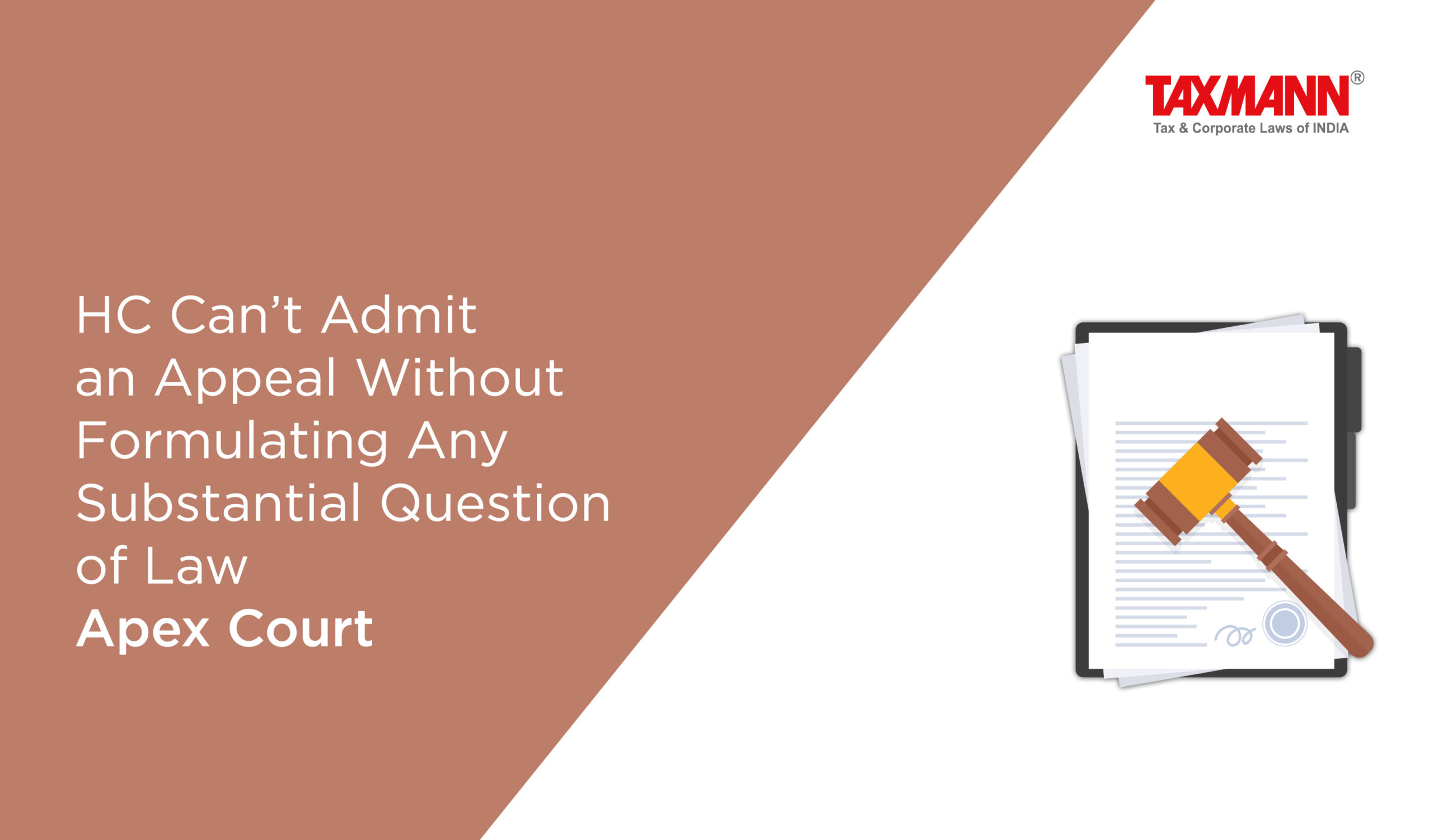HC Can’t Admit an Appeal Without Formulating Any Substantial Question of Law | Apex Court
- Blog|News|Income Tax|
- 2 Min Read
- By Taxmann
- |
- Last Updated on 6 September, 2023

Case Details: Bikram Singh v. Principal Commissioner of Income Tax - [2023] 154 taxmann.com 80 (SC)
Judiciary and Counsel Details
-
- B.V. Nagarathna & Ujjal Bhuyan, JJ.
- C.S. Aggarwal, Sr. Adv. Ravi Prakash Gupta, Uma Shankar, Ms Pushpa Sharma, Ms Devina Bhandari, Advs. & Bhargava V. Desai, AOR for the Appellant.
- Balbir Singh, A.S.G. Prashant Singh Ii, Ms Monica Benjamin, Apoorv Kurup, Ashok Panigrahi, Ms Vimla Sinha, Advs. & Raj Bahadur Yadav, AOR for the Respondent.
Facts of the Case
During assessment proceedings, the Assessing Officer (AO) added to the assessee’s income under section 68 regarding loans/advances received from eight persons. The additions were made because the assessee could not establish the identity, creditworthiness and genuineness of said persons and transactions.
However, the additions were deleted during the appellate proceedings. The matter reached the Delhi High Court. The Court admitted the appeal and held that the mere establishment of identity and the fact that amounts had been transferred through cheque payments did not mean that transactions were genuine. Accordingly, the HC restored additions made by the AO.
The assessee, aggrieved by the judgment passed by the High Court of Delhi, filed an appeal to the Supreme Court contending that the appeal filed under Section 260A of the Income Tax Act, 1961 was disposed of on merits without being argued on the substantial question of law.
Supreme Court Held
The Supreme Court held that the High Court had not followed the procedure contemplated under Section 260A. It should be noted that an appeal before the High Court is maintainable only on a substantial question of law (not a question of fact or only a question of law).
The High Court, when entertaining such an appeal, must formulate that question and admit the appeal. Thereafter, the respondent must also be heard on the question so formulated. Consequently, the matter must be disposed of depending on whether the substantial question of law must be answered for or against either of the parties.
In the instant case, it was found that the High Court did not formulate any substantial question of law when admitting the appeal. Instead, the appeal was heard on merits.
The Supreme Court held that the High Court has either to admit or not admit the appeal. If the High Court admits the appeal, then substantial question(s) of law have to be framed, and the respondent put on notice of such substantial question(s) of law. On the contrary, the appeal must be dismissed if the High Court believes that no substantial question of law arises.
Therefore, the matter was to be remanded to the High Court for reconsideration of the appeal filed by revenue having regard to essentials of section 260A.
Disclaimer: The content/information published on the website is only for general information of the user and shall not be construed as legal advice. While the Taxmann has exercised reasonable efforts to ensure the veracity of information/content published, Taxmann shall be under no liability in any manner whatsoever for incorrect information, if any.

Taxmann Publications has a dedicated in-house Research & Editorial Team. This team consists of a team of Chartered Accountants, Company Secretaries, and Lawyers. This team works under the guidance and supervision of editor-in-chief Mr Rakesh Bhargava.
The Research and Editorial Team is responsible for developing reliable and accurate content for the readers. The team follows the six-sigma approach to achieve the benchmark of zero error in its publications and research platforms. The team ensures that the following publication guidelines are thoroughly followed while developing the content:
- The statutory material is obtained only from the authorized and reliable sources
- All the latest developments in the judicial and legislative fields are covered
- Prepare the analytical write-ups on current, controversial, and important issues to help the readers to understand the concept and its implications
- Every content published by Taxmann is complete, accurate and lucid
- All evidence-based statements are supported with proper reference to Section, Circular No., Notification No. or citations
- The golden rules of grammar, style and consistency are thoroughly followed
- Font and size that’s easy to read and remain consistent across all imprint and digital publications are applied



 CA | CS | CMA
CA | CS | CMA
